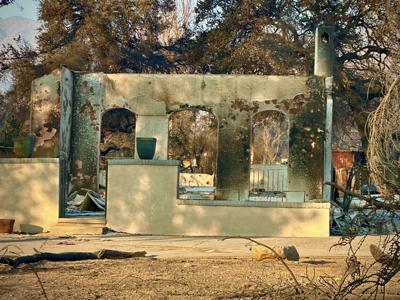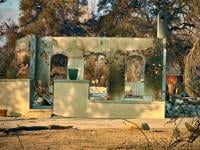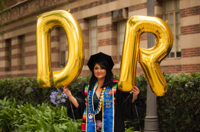
Debris left by the Eaton Fire. (Brenda Verano/CALÓ News)
The devastating wildfires sweeping through Los Angeles County this January tell a story of two communities facing unequal burdens. In Altadena and Pacific Palisades, the numbers reveal a stark reality: while Latino workers make up just 23% of residents in fire-affected zones, they represent 36% of the workforce there. In the historically Black community of Altadena, nearly half of Black households have seen their homes destroyed or significantly damaged by the Eaton Fire – a rate 30% higher than their neighbors.
These disparities are no accident. They stem from decades of housing discrimination and economic inequality that have left Black and Latino communities more vulnerable to disaster's impacts. In Altadena, the legacy of 1930s redlining concentrated Black homeowners in areas that today face the highest fire risk. Meanwhile, across the fire zones, Latino workers – many in service jobs that cannot be done remotely – face devastating economic disruption with few safety nets.
The human cost is profound. At least 35,000 Latino workers have been displaced from their jobs. In Altadena, where 57% of Black homeowners are seniors, and nearly half were already spending over 30% of their income on housing costs before the fires, many face the real possibility of permanent displacement from a community their families have called home for generations.
This crisis demands an equitable recovery plan that recognizes these distinct vulnerabilities. We need direct financial assistance that accounts for historical barriers to wealth building, not just pre-fire property values. Small business grants must reach Black and Latino entrepreneurs, many of whom operate informal businesses excluded from traditional aid programs. And rebuilding contracts should prioritize local minority-owned firms, ensuring recovery dollars strengthen rather than further strain affected communities.
Governor Newsom's disaster declaration opens vital resources, but implementation must explicitly address racial disparities. Black and Latino Californians have been essential to building this state's prosperity. Now, as climate change makes disasters like these more frequent, we have a moral obligation to ensure recovery efforts don't just restore what was lost, but help create the equitable, resilient communities all our residents deserve.
These fires have exposed the fault lines of race and class that still shape disaster vulnerability in California. As we rebuild, we face a choice: we can perpetuate these inequities, or we can seize this moment to demonstrate that equity isn't just a buzzword but a blueprint for true resilience. Our Black and Latino communities deserve nothing less.
The path forward requires concrete action: direct financial aid for impacted homeowners and workers that accounts for historical barriers to wealth accumulation, grants for small businesses to rebuild, strong protections against predatory development, living wage jobs for individuals with barriers to employment and the intentional inclusion of Black- and Latino-owned firms in reconstruction. Together, we can ensure that recovery doesn't just mean rebuilding structures, but rebuilding trust and opportunity for communities that have too often been left behind when disaster strikes.











(0) comments
Welcome to the discussion.
Log In
Keep it Clean. Please avoid obscene, vulgar, lewd, racist or sexually-oriented language.
PLEASE TURN OFF YOUR CAPS LOCK.
Don't Threaten. Threats of harming another person will not be tolerated.
Be Truthful. Don't knowingly lie about anyone or anything.
Be Nice. No racism, sexism or any sort of -ism that is degrading to another person.
Be Proactive. Use the 'Report' link on each comment to let us know of abusive posts.
Share with Us. We'd love to hear eyewitness accounts, the history behind an article.